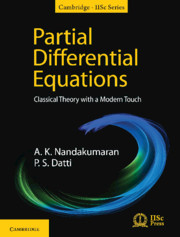Book contents
- Frontmatter
- Dedication
- Contents
- List of Illustrations
- Preface
- Acknowledgments
- Notations
- Chapter 1 Introduction
- Chapter 2 Preliminaries
- Chapter 3 First-Order Partial Differential Equations: Method of Characteristics
- Chapter 4 Hamilton–Jacobi Equation
- Chapter 5 Conservation Laws
- Chapter 6 Classification of Second-Order Equations
- Chapter 7 Laplace and Poisson Equations
- Chapter 8 Heat Equation
- Chapter 9 One-Dimensional Wave Equation
- Chapter 10 Wave Equation in Higher Dimensions
- Chapter 11 Cauchy–Kovalevsky Theorem and Its Generalization
- Chapter 12 A Peep into Weak Derivatives, Sobolev Spaces and Weak Formulation
- References
- Index
Chapter 11 - Cauchy–Kovalevsky Theorem and Its Generalization
Published online by Cambridge University Press: 20 May 2020
- Frontmatter
- Dedication
- Contents
- List of Illustrations
- Preface
- Acknowledgments
- Notations
- Chapter 1 Introduction
- Chapter 2 Preliminaries
- Chapter 3 First-Order Partial Differential Equations: Method of Characteristics
- Chapter 4 Hamilton–Jacobi Equation
- Chapter 5 Conservation Laws
- Chapter 6 Classification of Second-Order Equations
- Chapter 7 Laplace and Poisson Equations
- Chapter 8 Heat Equation
- Chapter 9 One-Dimensional Wave Equation
- Chapter 10 Wave Equation in Higher Dimensions
- Chapter 11 Cauchy–Kovalevsky Theorem and Its Generalization
- Chapter 12 A Peep into Weak Derivatives, Sobolev Spaces and Weak Formulation
- References
- Index
Summary
INTRODUCTION
In this chapter, we consider equations with analytic coefficients and discussthe existence and uniqueness of their solutions. Historically, theCauchy–Kovalevsky Theorem (CKT) is one of the first results in thetheory of partial differential equations (PDE) that addressed the questionof existence and uniqueness of solutions. Its proof introduced the conceptsof estimates that are at the heart of the modern PDE techniques. In fact,these estimates are known as a priori estimates for thesolution and its derivatives, derived before establishing the existence of asolution. More precisely, assuming the existence of a solution, suchestimates are derived. Thus, a priori estimates arenecessary conditions for the existence of a solution. The strategy is to usea priori estimates to define a suitable class offunctions in which a solution is sought. The rapid development of modernfunctional analysis provided impetus to the study of PDE and in the currentscenario, the study of PDE may be termed as advanced or applied functionalanalysis.
We first discuss the CKT for linear equations and then its generalization toa system of linear equations. Many of the books on the subject deal withthis classical theorem. We cite here John (1978), Hörmander (1976),Trèves (2006), and Folland (1995), among others. We follow theprocedure in Hörmander (1976) very closely for linear equations andTrèves (2006), Caflisch (1990), for linear systems.
We begin with a discussion of analytic functionsu(z) of n complex variablesz =(z1,…,zn) ∈ℂn. We use the followingnotations throughout this chapter: Let z0∈ ℂn and let u bea complex-valued function defined in a neighborhood ofz0. The function u is saidto be analytic at z0 ifu has the power series representation
where the power series converges absolutely in a neighborhood ofz0. Here, denotes a multi-index withnon-negative integers and. It follows
immediately from (11.1) that u is infinitely differentiablein a neighborhood of z0 and
Here Da denotes the differential operator of order and. Inparticular, for each j = 1,2,…, n, the function of onecomplex variable
where zj’s are held fixed, is analytic ina neighborhood of z0j.
- Type
- Chapter
- Information
- Partial Differential EquationsClassical Theory with a Modern Touch, pp. 318 - 333Publisher: Cambridge University PressPrint publication year: 2020



